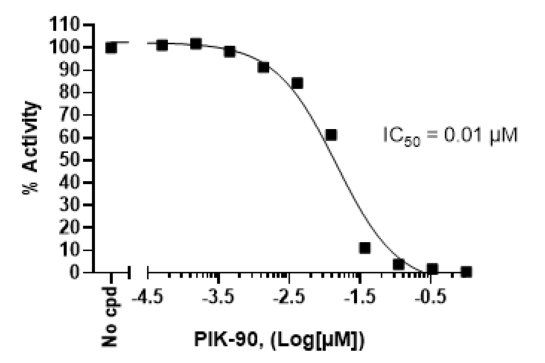Chemi-Verse™ PI3 Kinase (p110α/p85α) Kinase Assay Kit
The Chemi-Verse™ PI3 Kinase (p110α/p85α) Kinase Assay Kit is designed to measure kinase activity of the PI3 kinase (p110α/p85α) complex for screening and profiling applications using ADP-Glo™ as a detection reagent. The assay kit comes in a convenient 96-well format, with enough purified recombinant PI3 kinase (p110α/p85α), kinase substrate, ATP, and kinase assay buffer for 100 enzyme reactions.
- ADP-Glo™ Kinase Assay (Promega #V6930)
- DTT (Dithiothreitol), 1M, optional
- Microplate reader capable of reading luminescence
- Adjustable micropipettor and sterile tips
- 30°C incubator
| Catalog # | Name | Amount | Storage |
| 40621 | PI3 kinase (p110α/p85α)* | 2.5 µg | -80°C |
| 79334 | 5x Kinase Buffer 1 | 1.5 ml | -20°C |
| 79686 | 500 µM ATP | 50 µl | -20°C |
| 40560 | PI3K Lipid Substrate (Packaged separately, Do Not Freeze!) | 500 µl | 4°C |
| 79696 | White 96-well plate | 1 | Room Temp |
*The concentration of the protein is lot-specific and will be indicated on the tube.
PI3 (phosphoinositide 3) kinases, or phosphatidylinositol 3 kinases, are a family of proteins that can be subdivided into four classes: I, II, III and IV. Class I are involved in converting PI (4, 5) P2 (phosphatidylinositol (4, 5)-biphosphate) into PI (3, 4, 5) P3 (phosphatidylinositol (3, 4, 5)-triphosphate) when activated by tyrosine kinase receptors and G-protein coupled receptors. They are heterodimeric proteins with a regulatory and a catalytic subunit. The heterodimer between p110 (catalytic subunit) and p85 (regulatory subunit) belongs to class IA. p110 and p85 have three variants each. p110α is ubiquitously expressed, and p85α is the most abundant variant of p85. Class I PI3K participates in cell signaling, mostly via the activation of PKB (protein kinase B) and the PI3K/AKT/mTOR pathway. Dysfunction of these kinases impacts cell growth and differentiation, and mutations in p110α have been linked to cancer. At least three isoform-specific inhibitors are approved by FDA for the treatment of lymphoma and leukemia. Further studies will help identify more selective inhibitors with a good tolerance that can bypass the development of drug resistance.
Vanhaesebroeck B., et al., 2021, Nature Reviews Drug Discovery 20: 741-769.


